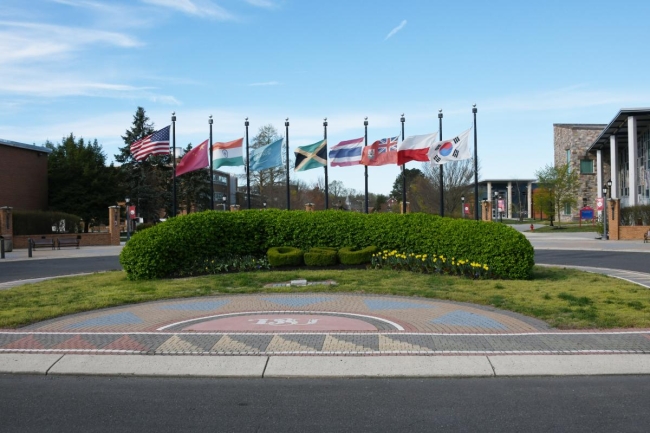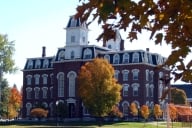You have /5 articles left.
Sign up for a free account or log in.

Delaware State University is fueling an acquisition plan with recently secured donations.
Courtesy of Delaware State University
Buoyed with cash from two major gifts, Delaware State University is on track to complete its acquisition of Wesley College in July.
In December, the public historically Black land-grant university announced the receipt of a $20 million gift from MacKenzie Scott, an author and philanthropist and one of the world’s wealthiest women. A portion of that gift will be put toward acquisition transition costs, but the university hasn’t determined exactly how much, said Tony Allen, president of Delaware State.
A few days later, the university said it had received $1 million from the Longwood Foundation, a charitable organization that invests in Delaware nonprofits. The Longwood gift will also pay for transition expenses.
When the acquisition was announced last summer, its completion hinged on several contingencies, including Delaware State’s ability to secure private and government funding to manage the acquisition. Allen said he’s confident the university will raise enough money to complete the deal without cutting into the university’s operating budget -- a promise Delaware State made at the outset.
In total, the acquisition will cost about $15 million over three years, Allen said. The university has received some money from the state to complete the acquisition but did not disclose how much. Allen said he will not ask for additional state funding until the acquisition is complete.
“I made a special declaration that until the transition was done, we wouldn’t be asking the state for additional resources,” he said.
Delaware State announced in July 2020 that it will acquire Wesley College, a small, private liberal arts college in downtown Dover, Del. A successful acquisition will make Delaware State the first historically Black university to buy a non-HBCU institution, and the second to acquire one. Tennessee State University, a historically Black university in Nashville, was the first to acquire a non-HBCU institution when it took over the University of Tennessee at Nashville through a court-ordered merger in 1979.
Remaining Wesley students will have the option to transfer to Delaware State to complete their degrees. The two institutions are working on a teach-out plan, which the Middle States Commission on Higher Education, their accreditor, will need to approve.
One reason Allen believes the Wesley acquisition is a good fit for Delaware State is that the racial and ethnic makeup of Wesley’s student body is similar to Delaware State’s. Wesley is a minority-serving institution, and 39 percent of its students are Black or African American. More than a third of Wesley students are white, 8 percent are Hispanic or Latino and 7 percent are two or more races, according to the National Center for Education Statistics. By comparison, more than two-thirds of Delaware State students are Black or African American, 9 percent are white and 6 percent are Hispanic or Latino. Both Delaware State and Wesley draw most of their students from outside Delaware.
Delaware State expects to add about 900 students through the acquisition, which would increase student head count by nearly 18 percent. Enrollment has grown by 40 percent in the past decade, Allen said. This past fall, the university welcomed 5,027 undergraduate, graduate and online students -- only a couple dozen students short of last fall, when 5,054 students set an enrollment record.
Meanwhile, enrollment at Wesley College has steadily declined since the 2006-07 academic year, when the college counted more than 2,100 full-time undergraduate students, according to NCES. During the 2018-19 academic year, the college enrolled only 1,122 full-time undergraduate students.
Wesley College has sought to be acquired for several years, said Robert Clark, its president.
“Very early on, I started looking very hard at finding this partner, finding somebody who would be interested in an acquisition-merger,” Clark said. “Not just purely from a financial or books standpoint, but more importantly for doing something that will truly expand the opportunities that the combined institution would provide.”
Wesley had been fairly far along in acquisition talks with another institution before Delaware State approached, Clark said. He did not name the other institution. Ultimately, Clark and the board liked that Delaware State was nearby and decided to move forward with the university.
While it searched for a buyer, Wesley received more than $6 million in state funding and was approved last year for an additional $3 million as needed to remain open. Clark said he’d received some pushback from state legislators and others who were skeptical about funneling public dollars to a private institution. The state support that kept Wesley afloat was an investment in regional and state education, Clark argued.
“The days of private and public are, I think, in the past. It’s: What’s the return on investment to the region and the state that we serve?” Clark said. “That drove the investment.”
Over the past six months, the Dover community has grown more enthusiastic about the acquisition, Allen said.
“If Wesley went away and there was no one to support them in this way, it would have been devastating to Dover,” he said. “So I think the Dover community generally -- and, I would say, Delaware writ large -- believes that the acquisition is an important one.”
Delaware State will take over Wesley’s 50-acre campus in downtown Dover, which is home to about 20 academic buildings, Allen said. The college has maintained strong health-science programs that the university hopes to capitalize on.
“Our biggest thought is to really build capacity for our college of health and behavioral sciences. Wesley has some health science-related programs, particularly nursing and occupational therapy programs that I think are best in class,” Allen said. “We want to be able to match that with our current college of health and behavioral sciences and create a downtown campus that reflects those particular disciplines.”
Allen didn’t have an update on how many Wesley employees will be hired by Delaware State. His comments mirrored what he said in July, when the acquisition was first announced.
“We always will have some Wesley employees come over to Delaware State. We haven’t made final determinations about who those folks will be,” he said.
That said, it’s likely that Delaware State will need additional faculty members to support the influx of Wesley students.
“We’ve grown our student population significantly over the last 10 years or so,” Allen said. “We’ve held our faculty in particular pretty flat over that same time period, so we do see some opportunity to bring over Wesley personnel to support what will effectively be an additional 1,000 students.”
Wesley's president, Clark, said there are no plans for him to join Delaware State in any capacity.








